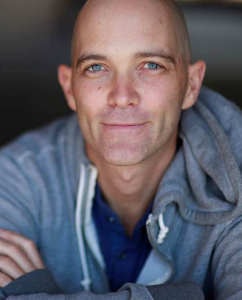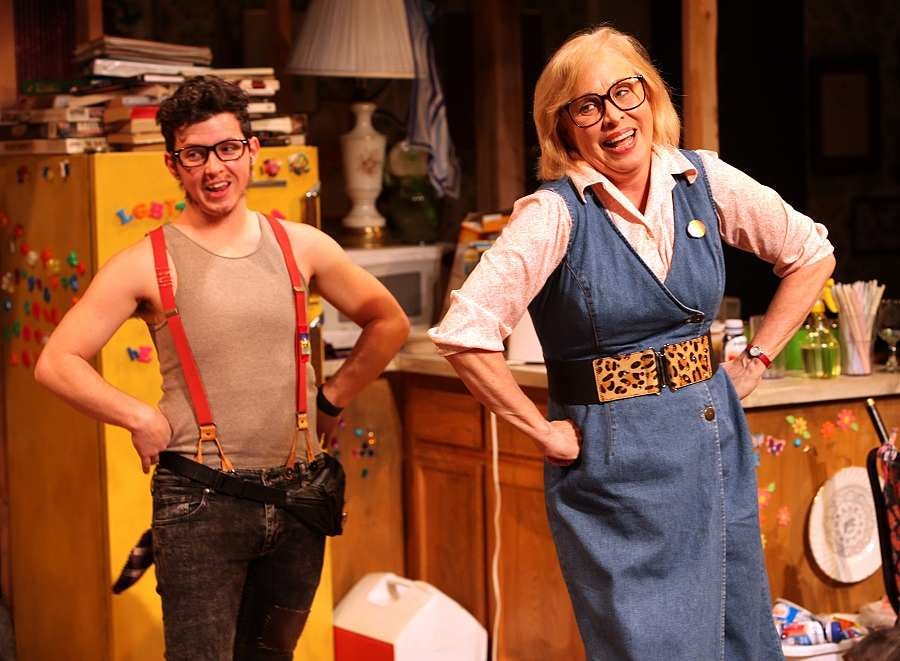The full script of Taylor Mac’s new play Hir is published exclusively in the December print edition of American Theatre; it premiered at San Francisco’s Magic Theatre earlier this year, and will be performed Feb. 27-Mar. 22 at Mixed Blood Theatre in Minneapolis before making its way to Playwrights Horizons in New York City next season.
Mac recently sat down with fellow performer-turned-playwright Lisa Kron (Well, Fun Home) to talk about the play and his process.
LISA KRON: I loved reading this play. It’s not surprising that your voice is so strong and so vivid, but I feel like it’s a slightly different voice than I’ve experienced in your work before.
TAYLOR MAC: Yeah, I’ve never written a full-length kitchen-sink drama before—a single-set, four-character play.

What did you start with?
I wanted to tell a story about what it was like growing up in Stockton, California, and why I left, and that morphed into what the play is now. What I was trying to do was write a eulogy for the kitchen-sink drama, as a metaphor for the old world orders that aren’t working anymore. Here we are venturing off into a new world order; so let’s say goodbye to the kitchen-sink drama. Originally the goal was to write a conventional family drama and then break that open. There was a draft where the house burned down. There was a draft where the house collapsed—both of which I’m so happy I didn’t do, because Lisa D’Amour burned down her house [Detroit], and I forget who else had their house collapse.
Branden Jacobs-Jenkins [Appropriate]!
Right. Both of which are fantastic plays, so thank God I didn’t do that! I tried to make it theatrical at the end, where we’d explode into this new world, and finally the play just kept wanting to just actually be in the genre that it’s written in.
For me, what has always given your work a serious depth is your interest in occupying (and beautifully filling out) a world of difference and outsiderness, and claiming it as the center—and then also taking into account whatever is in opposition to that.
Justin Vivian Bond, as Kiki, says in the Carnegie Hall Show [Kiki and Herb], “I’ve been to your institutions! I’ve been to your learning facilities! I’ve been to your churches!” Since I heard that, I thought about how I grew up in this conservative world—homogeneous, suburban, what is often called “Real America.” I went to the churches and I went to the learning facilities, so I learned that culture, and now I’ve broken out of it and am learning, in my adult life, a whole new way of living and being. So I’m interested in how those two come together.
I was just rereading the amazing manifesto you gave last year at the Under the Radar Festival, in which, in your generous way, you call out institutions and artistic directors. I’m curious about your experience of starting to bring your work inside institutional theatre.
In terms of being in conversation with institutions about producing my work, I’ve been trying to get a particular artistic director to read or see my my plays for almost 20 years. And I finally get him to read this play, and he says, “I was so surprised! You’re a real playwright. All these years, I knew you were in New Dramatists, and people said you were a playwright. But I just assumed you weren’t really a playwright because you do this”—he didn’t say “performance art ” but that’s what he was trying to say. And this thing I’d been warned about when I first started making my own work, that if I did more than one thing it would be doubly hard to get people to take my playwriting seriously, was actually confirmed. So it took a little longer than I would have liked to start collaborating with the institutions, but it’s all working out so, that’s pretty great.
Let’s talk a little bit about the trans character. Do you consider yourself trans?
I consider myself genderqueer, which is just a way of saying that I’m a little bit of everything, and I don’t quite know, and I’m leaving it open. But I spend a lot of my life in some weird gender confluence, so I feel confident to say I’m genderqueer, even though I would say the majority of my life is spent as what most people would identify as male, and as an actor I’m more interested in playing men than genderqueers or women.
You have stipulated in your character descriptions that it is your preference that that character [Max] be played by someone who was born a woman and is now male?
Yes. Max should be played by a transgender male. I thought, “Can the character be played by genderqueers, transgender females? Why am I limiting this?” But it’s that Ruth Margraff thing, which I put a little bit of in the play, that says you can’t mess with content and form at the same time. And for most of my career, and I think your career, too, we have been messing with content and form at the same time. There’s great joy in that, and benefits in that, but there’s some casualty to that as well, because many audience members will shut down, much like Arnold in the play, when too much new stuff is presented to them. So it was important that Max initially look like what an audience (made up of people who aren’t as progressive as Max and Paige) expects to see when you say someone has transitioned from being a biological female to a transgender male. Then later on we can play with people’s expectations when our trans-masculine character likes to wear dresses.
So you think the productions will it be more specific and more accurate if a young trans man plays that part?
I’m a big fan of duality on stage. I like to see the character and the performer at the same time. When you can cast somebody who actually is transgender performing the role, it’s just deeper. You don’t see the exact history of the actor, but you can bring a little bit of the reality into the theatre, and the theatre into the reality, and that’s the great joy for me. Usually I don’t decide what gender the characters are until the first draft is done, if ever, but from the get-go I knew Max had to be transgender or genderqueer. The characters are trying to figure out what to do with masculinity. To get at that, it was important to me that one of the characters come from the middle.
Another thing I really love about this play is the way it acknowledges change has a cost. I often feel that in certain political discussions—gender parity in theatre, for instance, which I absolutely support—we focus on what will be gained but avoid acknowledging that offering more opportunity to an excluded group might involve displacing others.
And is there a responsible way to deal with that cost? Do we have to kick the boys out and have them sleeping in the street? There’s this whole generation of older, white men who are filled with rage right now, because they watch Fox News all day long and they feel like they’re not a part of the culture and they’re being discarded. How do we deal with that? They cannot be in charge anymore! But how do we deal with it?
Like you, I began studying theatre in traditional ways, then found my way to downtown theatre where I was formed as a theatre artist. The WOW Cafe, which was my theatrical home for many years, was a true “community theatre.” Often when I talk to young people, they’re surprised that I wasn’t plotting my career at WOW. In fact I was thinking, “If I want a career, I need to leave this place and go to some Equity showcase auditions.” I’m curious to hear your thoughts about the relationship between doing work on your own terms, often outside of the institutional and commercial world, and making a living doing it?
I’ve never made anything, as a writer, that I didn’t care passionately about. I can’t say that about my acting career, but the performance art and the playwriting are always what I want to make. I’m not the kind of writer who sits down and writes every day just for the joy of it. I really have to care about what I’m writing about in order to get my butt in the seat. Having said that, I am interested in getting my work in larger venues—not changing the work for the venue but convincing the larger theaters that the work is appropriate for them, which it is.
Partially because I’m trying to get the Fool back in the court, but also because I’d rather not work in the theatre at all than produce another one of my plays under an Equity Showcase code, where you don’t really pay anyone, your casting options are limited, you maybe have one preview, the critics come on the second performance (if not first), you have 16 performances and then you’re done and you never do the play again. A couple years ago I said I’d never do another one of those Showcase Codes again, and though I haven’t had a play produced in NYC for the last four years, as a result, the dry spell is coming to an end. Playwrights Horizons will be producing the New York premiere of Hir in its 2015-16 season. It’ll be my first Off-Broadway production. And if it’s another 20 years before the next one, I’ve always got that performance art career to fall back on.


